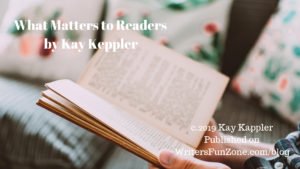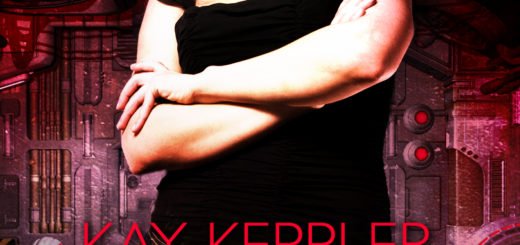What Matters to Readers by Kay Keppler
 Let’s welcome back monthly columnist, editor, and novelist, Kay Keppler, as she shares with us “What Matters to Readers.” Enjoy!
Let’s welcome back monthly columnist, editor, and novelist, Kay Keppler, as she shares with us “What Matters to Readers.” Enjoy!
***
Writers get a lot of advice. They’re told to write what they know or explore new worlds. To grab readers in the first paragraph or do a slow build. They pay attention to structure and pacing, voice and character arc, all to make readers pick up a story, engage with it, and read it to its conclusion. But do they?
What Do Readers Want, Anyway?
Barbara Linn Probst is a novelist and researcher who holds a Ph.D. in clinical social work. She recently conducted a very informal, nonscientific survey to find out what made readers love a novel. As a novelist, she felt that she was thinking like a technician, not a reader. She believes that readers don’t necessarily think along structural terms—for example, they don’t necessarily analyze that they love a book’s pacing, therefore, they love the book.
A Survey Reveals…
She decided to ask readers what makes them love a novel. She conducted a simple, voluntary survey consisting of only one open-ended question: What makes you love a novel? She posted the question on eight Facebook groups for readers, emphasizing that people could write whatever they liked. She received 173 responses.
Of course, this is a small sample, and it can’t possibly represent all readers. However, it probably does represent to some degree a section of readers who care enough about books to join an online community, think about what they read, and take the time to make their views public. Avid readers, in other words.
…Readers Like Everything
The most frequently cited reasons for loving a novel were:
- The characters (24%)
Within the category of “characters”:
Well developed, authentic/relatable characters (11.4%)
Emotional connection/caring about the characters (5%) - A great storyline, with plenty of twists and turns (11.5%)
- The experience of immersion and emotional engagement (9%)
- A chance to learn something new/made me think (6.3%)
- The quality of the writing, including the voice (6%)
Other elements that respondents mentioned included good dialogue, humor, an evocative setting, and a satisfying ending.
Readers Take Time to Decide
Probst points out that the question What makes you love a novel? is reflective; it’s what you understand about the book after you’ve finished it. It doesn’t reflect why a reader picked up a book in the first place. However, she anticipated that reader responses would span three points in time:
- Initial encounter: Did the book grab my interest? Did I love it, right from the beginning?
- Throughout: Did the book sustain my interest? Did I want to keep reading to the end?
- Afterward: Did I think about it later? Remember it? Recommend it?
As writers, we’re told how crucial that first impression is, but in Probst’s survey, there were only 12 references to the importance of that early “grab” (among 493 data points collected). Only five readers of the 173 said this had to happen on page one.
What Readers Don’t Like
Several people volunteered information about what they disliked about novels, offering reasons they stopped reading a book. Some disliked long wordy descriptions; others disliked devices such as multiple time lines or points of view, which they found confusing and disruptive. A straightforward, emotionally compelling, and interesting story—that was what they liked, not a sophisticated structure.
The Dichotomy of Function
What I found interesting about this survey is that some of the findings dovetail with what we might expect, but some don’t. There seems to be a significant gap between what writers work on, what agents and editors expect to see, and what readers care about.
Writers care about goal, motivation, conflict, stakes—all of that. Agents are pressed for time; they need to see a quick initial spark—a flash bang—in a query letter or the first pages of a manuscript or they stop reading. But 93% of readers take a lot longer to decide if they like a book—often they don’t decide until they reach the end.
What Are You Writing?
What does this mean for you, the writer looking to write the best book you can? This survey—and any survey, really—isn’t definitive. It’s a quick capture of a specific point in time by a few respondents.
But the responses feel true to me. And what I get from it is that you can’t possibly incorporate all the expectations and desires of agents or editors and readers while writing the best story you can. So it’s more important than ever to write the book of your heart, the book you want to write in the way the story wants to be told, the book that resonates with you, in the hope that it will resonate with readers, too. Keep the noise of publication and sales as far away as possible. When the time comes to sell your book to an agent or editor, find a way to pitch it that captures their imagination.
And then you hope that readers love it—and come back for more.
***
ABOUT THE AUTHOR
Kay Keppler is an author Zero Gravity Outcasts, Betting on Hope, Gargoyle: Three Enchanting Romance Novellas, and editor of fiction and nonfiction –Angel’s Kiss and Outsource It!
is an author Zero Gravity Outcasts, Betting on Hope, Gargoyle: Three Enchanting Romance Novellas, and editor of fiction and nonfiction –Angel’s Kiss and Outsource It!
She lives in northern California. Contact her here at Writer’s Fun Zone in the comments below, or at kaykeppler@yahoo.com to ask questions, suggest topics, or if you prefer, complain.
***
More popular articles by Kay Keppler on Writer’s Fun Zone:







Thanks for this, Kay! It’s a good reminder, especially about description!
Thanks, Patricia! I’m glad if you found the article useful.